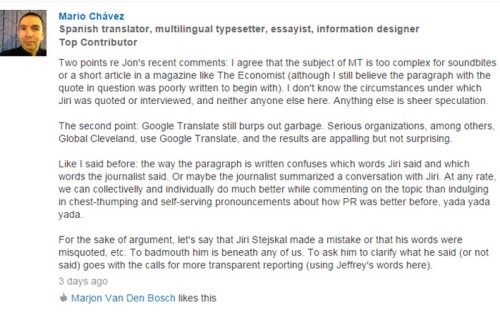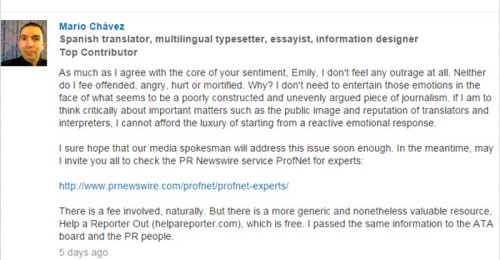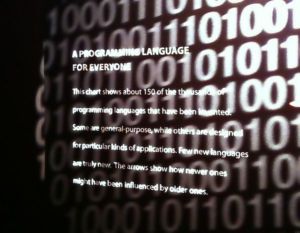The American Translators Association, a non-profit professional organism with a membership of approximately 11,000 in the United States, Canada, Europe and other countries around the world, is undergoing another set of growing pains. Its Board of Directors is made up of volunteers, most of whom are independent translators or small business owners like the readers of this blog.
Established in 1959 by a small number of New York City translators, ATA grew almost exponentially in the following decades. It currently has strong programs to reach out to novice translators and schools. Its media and public relations program has achieved important milestones in the last 15 years, thanks to driven people such as Chris Durban, Lillian Clementi and Kevin Hendzel, the latter becoming ATA spokersperson.
However, the ATA PR machine has undergone some painful internal motions in recent years, which culminated with the sudden resignation of its spokesperson, Kevin Hendzel, in 2012. He was replaced by Dr. Jiří Stejskal (no the ice hokey goaltender), a small businessman, owner of CETRA, with main offices in Elkins Park, PA. Mr. Stejskal is also a former ATA president.
A recent article published in the online site of The Economist quotes Mr. Stejskal thus:
“Machine translation” is the next step. Computers learn from huge databases of already-translated text to make ever-better guesses about how to render whole chunks from one language into another. Translators used to scorn this, seeing their human judgment as irreplaceable. Now, says Jiri Stejskal of the American Translators’ Association, it has won respectability.
This seemingly innocent statement caused a firestorm in the Yahoo! ATA Business Practices forum and in LinkedIn’s ATA discussion group this week, initiated by Mr. Hendzel:
When I first saw it, I assumed that it was sharing a link to an article about the ATA. Many translators did just that. It wasn’t until days that the reactions began to appear. Some commented on the outrageous quote, which many took as the ATA’s official position on MT (machine translation) having gained respectability. Mr. Hendzel, as it is his custom, rehashed his past role as ATA spokesman for a decade and how the ATA and translators in general had gained greater recognition during that time. At least, until 2012, when he resigned as spokesman. He further recited well-worn lamentations about the sad state of ATA in the field of public relations and the overall mismanagement perpetrated by members of the current ATA Board. The initial posting collected a thread of about 45 comments, some thanking Mr. Hendzel for bringing up the topic and others disagreeing with him.
I also participated in the discussion. Full disclosure: at first, I complained about the misquote and asked that Mr. Stejskal offered an explanation:
A second reading of the quote in question changed my mind. The quotation marks surrounding Machine Translation had thrown me off, and I erroneously attributed them to Mr. Stejskal. It was time to call for a step back. Is it possible that the writer’s stile was at fault here? I concluded that the article required a second or third reading.
I was confused, and doubts about blaming this “PR disaster” (according to Mr. Hendzel) on Mr. Stejskal deserved further analysis and cooler heads:
The discussion was boiling and not resolving anything. However, commenters were civil toward each other, despite the fact that clouds of doubt and something more, undefinable as yet, were mounting and hovering over the debate.
There were many sensible comments and I added what usually drives me to discuss things. I also sensed an agenda after carefully rereading the initial posting that started the thread: Why is Mr. Hendzel criticizing the ATA spokesman for saying the wrong thing? Why is he making Mr. Stejskal responsible for “killing our primary message”?
Before the reader arrives at wrong conclusions, this is not about the nice and sensible things I said. Since the thread includes 45 comments and due to the impracticality of quoting every single one of them, I’m using judgment to insert the ones that I think are necessary for my discussion on the matter. Nor is it my purpose to rant against anyone involved in the long conversation. I want to present the most salient facts for those interested precisely because it touches on the public image of the professional entity I belong to as a translator. From my exchanges with Mr. Hendzel since 2011, I knew him to be a consummate self-promoter, a superb presenter and a very articulate spokesperson. Behind all that, however, I could sense a tendency to indulge in hyperbole and extreme comparisons bordering on demagoguery. I pointed that to him on several occasions, both in public and in private exchanges. Therefore, that exposure cued me to some purpose in his carping against the current ATA spokesman. I considered the discussion another exercise in futility and kept my thought to myself.
First, upon Mr. Hendzel’s resignation in 2012, ATA had to find a new spokesman and Mr. Stejskal stepped in. Media interviews don’t always go the way the interviewee intended and it’s up to the journalist or editor what comes out as the final version in print (or on the air). That’s what seemed to have happened with The Economist paragraph. The portrayal of machine translation (MT) as given in the article does not represent ATA’s position on the matter. Second, ATA lost its paid media adviser when it defunded the media outreach effort.
Finally, some light at the end of the tunnel. Some much-needed clarity reached my thoughts and I thanked Ms. Clementi for the facts and her comments. The discussion was not going to end like so many others, however. It was not going to be another event blown out of proportion by hyperbolic statements. A fellow translator, James Kirchner, known for his sharp mind, wrote what he considered to be the motivation behind the whole thread by Mr. Hendzel. Summarizing his words, Mr. Kirchner said that Mr. Hendzel had misrepresented the Stejskal “quote.” Mr. Stejskal clarified the matter in the BP list that the paragraph in the article was not accurate and proceeded to repeat what he actually said to the journalist.
In Mr. Kirchner’s view, Mr. Hendzel is being unjustly critical of Mr. Stejskal and the whole argument is pointless: there is no crisis. Finally, Mr. Kirchner indicated 3 common threads in Mr. Hendzel’s press-related pronunciations in the past: 1) Mr. Hendzel and his team did a superb job as ATA liaisons with the media; 2) any other ATA media representative is incompetent, and 3) Mr. Hendzel prefers to criticize those in ATA who are working in his old position as spokesperson.
James Kirchner said what I was thinking, but with much more force and determination. The interesting thing about this is, I had said similar things to Mr. Hendzel in the course of other discussions in the last year and a half, with little consequence. So I started to ignore his postings. The ATA moderator for our discussion group reminded everyone of the netiquette rules: don’t attack anyone, be courteous, etc. Inside, I was a tad indignant because I didn’t want this uncovering of a self-absorbed individual go unnoticed. So I wrote this:

I finally expressed my thoughts about the propagandistic tone behind the announcer of the thread, Mr. Hendzel.
I was courting a reprimand, I know. I said what was on my mind without naming names, but it was clear who I was referring to. Being reprimanded was not a present worry for me, though. Then Mr. Hendzel did the unexpected: he said he would resign from ATA this week. He further claimed the dangers ATA was facing due to the lack of real leaders and improper management. He lamented over the years he served to promote ATA, adding, rather puzzingly, that ATA was like the Apple computer going the way of Radio Shack. He promised to keep active in his blog and his parting words made reference to pursuing better options to head media efforts at other translators organizations.
Kevin Hendzel announced, with his hallmark pomp and circumstance, that he was leaving the ATA. He shared his conviction that the ATA is on a downward spiral to ruin and irrelevance but that he was going to be better off elsewhere.
So it seems that Mr. Hendzel had been smarting from his resignation as ATA spokesman, burning with desire to keep working in some media capacity but still harboring a deep resentment, contempt and disdain toward other ATA officers and marked animosity against Mr. Stejskal for reasons unknown to us.
I used to respect Mr. Hendzel precisely for the PR achievements he scored for the ATA. I remember the occasions that I would hear about the ATA and its spokesman, Mr. Hendzel, on some radio or TV interview. He did provide a great service to our organization. Then, the assumption of a new board of directors in the second decade of the 21st century changed things for public relations and for Mr. Hendzel. The Board and Mr. Hendzel didn’t see things eye to eye, the former later defunding PR and media efforts and the latter resigning in the aftermath in 2012.
Kevin Hendzel says that it was a sad day for him. Well, it was a sad day for me and for many others who witnessed how this otherwise intelligent and highly skilled professional decided to tear down his own legacy by tearing apart the current ATA spokesman and whatever other PR initiatives were started and achieved after his departure. It is a very grey and dull epilogue of his own making, a bland departure for a heretofore sterling man with an ego to match and who couldn’t bow down with grace and dignity.
The main problem for most was the misquoted ATA position on machine translation. Mr. Stejskal, fully aware of the commotion caused elsewhere in LinkedIn, wrote a candid, calm and complete explanation on the topic, which is now considered closed. As a result, ATA is requesting a clarification on the misquote from The Economist.
In the larger horizon of news events, we can be sure that ATA spokespersons will be quoted, misquoted, underquoted in different media. Other bloggers will comment on the issue, not all of them connected to the translation activity. And ATA will issue clarifications and gain more recognition and stature in response, I surely expect. That’s basically what the cooler heads in the LinkedIn discussion thread were asking all the time.








You must be logged in to post a comment.